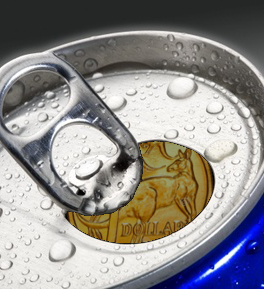Report calls for can scheme
 An inquiry has found that a container deposit scheme in Victoria could net the State Government $550 million.
An inquiry has found that a container deposit scheme in Victoria could net the State Government $550 million.
The Victorian parliamentary committee inquiry into recycling and waste management was launched amid an emerging industry crisis, with recyclers going bankrupt and household recycling dumped in landfill.
Among the inquiry’s 46 recommendations is the suggestion to create a container deposit scheme.
It also calls for an extra kerbside bin to be provided to households, and for the state to develop more waste-to-energy technologies.
The extra bin for glass collection, funded by the state, to reduce the mix of glass that makes it difficult to recycle.
“The committee believes that while the costs for such a scheme may be considerable, the overall benefits to Victoria's waste and resource recovery system are greater,” the report said.
“The Government should provide funding and support to councils to implement a separate municipal glass recycling bin.”
The report also recommends businesses keep compulsory detailed lists of chemical stockpiles, and make them available to the Environmental Protection Authority and emergency services.
It calls for measure to make major supermarkets reduce single-use plastics in the fruit and veg sections, and to encourage people to bring their own containers for deli products, “and/or the reintroduction of washable and reusable milk bottles”.
The report also recommends a “statewide recycling education campaign” to rival those “by the Transport Accident Commission and WorkSafe”.
The report said there is “a high level of public support … [and] several key stakeholders are in favour of the introduction of a [container deposit scheme]”.
The scheme could boost Victoria's budget by $551.5 million over a 10-year period, the officials found, according to a “model where the cost of the scheme is borne by drinks suppliers and the refund for each container was fixed at 10 cents”.
Victoria is currently the only Australian state without a container deposit scheme or plans to introduce one.
The State Government says it will respond within six months.
“These challenges didn't emerge overnight and won't be fixed overnight. It will take time, planning and coordination across all levels of government,” Energy, Environment and Climate Change Minister Lily D'Ambrosio said.
“We're supporting local councils, investing in infrastructure and working to grow stronger domestic markets to build a better recycling sector.
“There's more to do — particularly in finding end uses for the recycled materials and reducing the amount of waste we produce — but we've proven our resolve to meet these challenges.”







 Print
Print